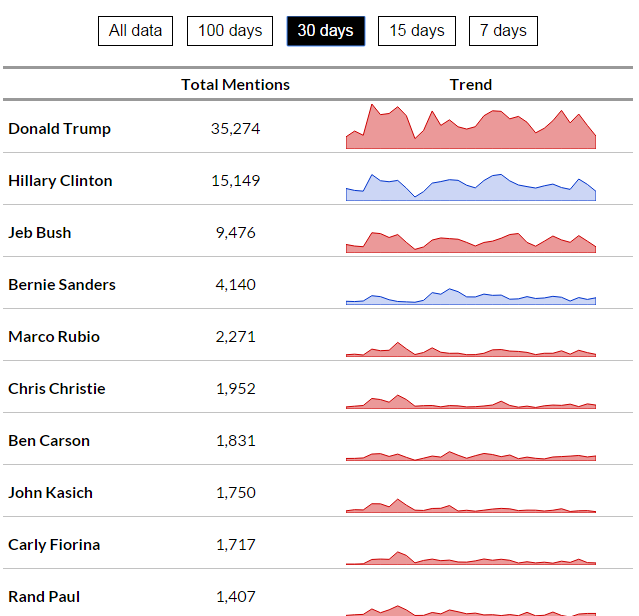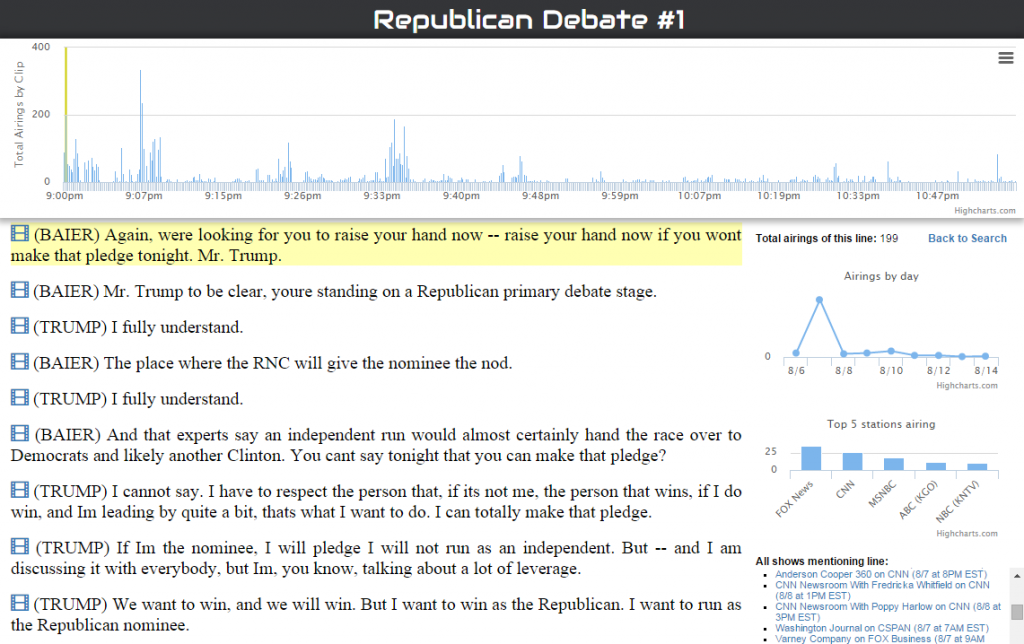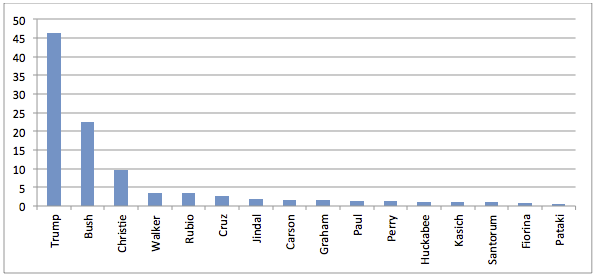When it comes to media coverage, it seems as if Donald Trump is “trumping” all his rivals, Republicans and Democrats alike. But is that true? And how does it vary by print, digital and television media? Using the Internet Archive’s Television Archive and the GDELT Project, researcher Kalev Leetaru is able to analyze daily data to see who is winning the media wars of 2016. Today we are excited to announce three new visualizations that explore American politics through the lens of television: a live campaign tracker hosted by The Atlantic that offers a running tally of all mentions of the 2016 presidential candidates across national television monitored by the Archive, and two visualizations that show which statements from the first Republican debate went viral on television. Finally, an analysis published in The Guardian shows just how unique television coverage of the campaign is and how much it differs from print and online coverage. Candidates live and die by their ability to capture media attention. Now, thanks to Leetaru, citizens have the tools to examine the election media data daily.
A Live 2016 Campaign Tracker

Media coverage of the 2016 presidential candidates has been dominating the news cycle for the last few months, with article after article asking which candidate is dominating the headlines at the moment. Working with The Atlantic, we created the visualization above that tallies how many times each candidate has been mentioned on domestic national television networks thus far in 2015. The list updates each morning, providing an incredibly unique peek into who is pulling ahead at the moment. For those interested in drilling further into the data, an interactive explorer dashboard allows you to drill down by candidate and network.
Who Won the First Republican Debate?

This past July we used audio fingerprinting technology from the Laboratory for the Recognition and Organization of Speech and Audio at Columbia University to scan the audio of all monitored television shows for two weeks after the President’s January 2015 State of the Union address and identified every time an excerpted clip of his speech was broadcast on another television show. In this way we were able to create an interactive timeline of which portions of his speech went “viral”.
We’ve repeated that process for the first Republican debate, both the “prime” and “undercard” events, exploring which soundbites made the rounds across television news shows in the week following the debate.
For the undercard debate, Carly Fiorina was the clear winner, account for 45% of the soundbites from the debate that subsequently aired elsewhere in the following week, followed by Rick Perry at 15.7%. Both of the most-excerpted responses from the undercard debate belonged to her, with her quote “Hillary Clinton lies about Benghazi, she lies about emails. She is still defending Planned Parenthood, and she is still her party’s frontrunner” appearing 53 times and her quote “Did any of you get a phone call from Bill Clinton? I didn’t. Maybe it’s because I hadn’t given money to the foundation or donated to his wife’s Senate campaign.” appearing 47 times.
For the prime debate, Trump was the overall winner, with 30.7% of the subsequently aired soundbites being his, followed by Rand Paul at 14.1% and Chris Christie at 13.7%. The two most-excerpted statements of the debate were both by Trump, one regarding his refusal to pledge not to run as an Independent, which aired 199 times, and the second about his past misogynic Twitter comments, which aired 337 times. Rand Paul and Chris Christie’s exchange about the fourth amendment and government surveillance aired 190 times, culminating in Rand Paul’s now-famous “I know you gave [President Obama] a big hug, and if you want to give him a big hug again, go right ahead.” Ben Carson’s closing remarks about his work as a surgeon were the most-repeated of any of the candidates, with 86 rebroadcasts over the following week.
How Much Coverage is Trump Really Getting?

Finally, with all of the hyperbole swirling about Trump’s utter domination of media coverage of the Republican race, a key question is just how much his lead differs across media modalities. Is online news coverage of 2016 campaign cycle identical to print coverage identical to television coverage? In a piece for The Guardian’s Data Blog, I explored election coverage across these different forms of media and found that Trump’s lead is entirely dependent on where you look, emphasizing just how important it is to be able to analyze television coverage directly.
As the 2016 political season begins to shift into high gear stay tuned for so much more to come as we explore television and politics!



